Lopburi
ลพบุรี | |
|---|---|
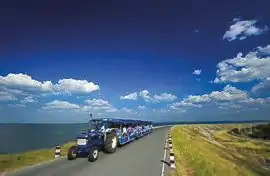 .jpg.webp)   (Clockwise from top left) Ridge of Pa Sak Jolasid Dam, Lopburi sunflower fields, Ban Pa Wai railway station, King Narai's Palace, Phra Prang Sam Yot | |
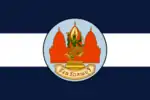 Flag 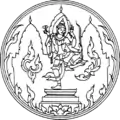 Seal | |
| Nickname(s): Lavo Mueang Ling (city of monkeys) | |
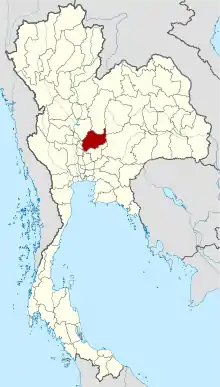 Map of Thailand highlighting Lop Buri province | |
| Country | Thailand |
| Capital | Lopburi |
| Government | |
| • Governor | Niwat Rungsakorn |
| Area | |
| • Total | 6,200 km2 (2,400 sq mi) |
| • Rank | Ranked 36th |
| Population (2018)[2] | |
| • Total | 758,733 |
| • Rank | Ranked 32nd |
| • Density | 122/km2 (320/sq mi) |
| • Rank | Ranked 40th |
| Human Achievement Index | |
| • HAI (2017) | 0.5797 "average" Ranked 44th |
| GDP | |
| • Total | baht 112 billion (US$3.6 billion) (2019) |
| Time zone | UTC+7 (ICT) |
| Postal code | 15xxx |
| Calling code | 036 |
| ISO 3166 code | TH-16 |
| Vehicle registration | ลพบุรี |
| Website | www |
Lopburi (Thai: ลพบุรี, RTGS: Lop Buri,[5] pronounced [lóp bū.rīː]) is a province in the central region of Thailand. The province is divided into 11 administrative districts, and Mueang Lopburi district is the capital. With over 750,000 people, the province is Thailand's 36th largest area and 32nd most populous. There are eight neighboring provinces, Phetchabun, Chaiyaphum, Nakhon Ratchasima, Saraburi, Phra Nakhon Si Ayutthaya, Ang Thong, Sing Buri, and Nakhon Sawan.
Lopburi is a significant province historically, where many historical structures, artifacts, and prehistoric settlements have been discovered. In the past, Lopburi was called by the name Lavo, after the Lavapuri, (present day Lahore) city named after the second son of Ram.The kingdom had been ruled by an absolute monarch.
Toponymy
It was originally known as Lavo or Lavapura, meaning "city of Lava" in reference to the ancient South Asian city of Lavapuri (present-day Lahore, Pakistan).[6]
History
Known as Lavo during much of its history, Lopburi probably dates to prehistoric times.[7] The name Lavo originated from the capital city of Lavo kingdom, an ancient Mon kingdom of Dvaravati period (6th–11th century CE).[8] The conquering Khmer would build many impressive temples in the city during its rule. Lopburi may even have liberated itself for a time, as it sent independent embassies to China in 1115 and 1155. In 1289 it sent another embassy to China, but soon became part of the Thai kingdom of Sukhothai and later Ayutthaya.
During the Ayutthaya period, King Ramathibodi I sent Phra Ramesuan (later King Ramesuan) as the Uparaja to reign in Lopburi. In 1666 King Narai the Great ordered a new palace built on the east bank of the Lopburi River and made Lopburi the second capital of the country, as Ayutthaya was threatened by the Dutch. After King Narai died, the city was almost abandoned and fell into ruin.
In 1856 King Mongkut of the Chakri dynasty ordered King Narai's palace to be renovated. The city finally regained its importance in 1937, when Field Marshal Plaek Phibunsongkhram chose Lopburi to be the largest military base in Thailand and once was decide to be new capital city of Thailand after the end of World War II.[9]
Geography
Lopburi is on the east side of the Chao Phraya River valley, between the Lopburi River and Pa Sak Rivers. Thirty percent of the area of the province, including most of Tha Wung district, the southwestern parts of Mueang Lopburi and Ban Mi districts are a very low alluvial plain. The other 70 percent is mixed plains and hills, with the Phetchabun Mountains forming the eastern boundary of the province towards the Khorat Plateau. The total forest area is 962 km2 (371 sq mi) or 14.8 percent of provincial area.[10]
Wildlife sanctuary
There is one wildlife sanctuary in region 1 (Saraburi branch) of Thailand's protected areas.
- Sap Langka Wildlife Sanctuary, 155 km2 (60 sq mi)[11]: 5
Climate
Lopburi province has a tropical savanna climate (Köppen climate classification category Aw). Winters are dry and warm. Temperatures rise until May. Monsoon season runs from May through October, with heavy rain and somewhat cooler temperatures during the day, although nights remain warm. Climatic statistics: Its maximum temperature is 41.4 °C (106.5 °F) in April and the lowest temperature is 10.2 °C (50.4 °F) in December. The highest average temperature is 36.8 °C (98.2 °F) and the minimum average temperature is 20.6 °C (69.1 °F). Annual average rainfall is 1,125 millimeters with mean rainy days is 17.6 in September. Maximum daily rainfall is 203.4 millimeters in October.[12]
Symbols
The provincial seal shows Vishnu in front of the Khmer temple Phra Prang Sam Yod.[13]
The escutcheon of Lopburi shows Phra Narai and in the background Phra Prang Sam Yod, the "Sanctuary with the Three Towers". It refers to King Narai who in 1664 fortified the city to be used as an alternative capital when Ayutthaya was threatened by a Dutch naval blockade.[14]
The provincial tree as well as the provincial flower is the bullet wood.[15]
The slogan of the province is National treasures of King Narai's palace and Phra Kan Shrine, famous Prang Sam Yot, city of Din So Phong Marl, well-known Pa Sak Cholasit Dam and golden land of King Narai the Great.
Administrative divisions
Provincial government
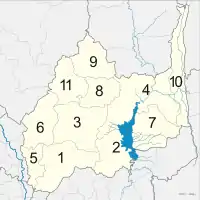
The province is subdivided into 11 districts (amphoe). The districts are further subdivided into 122 sub-districts (tambon) and 1,126 villages (muban).
Local government
As of 26 November 2019 there are:[16] one Lopburi Provincial Administrative Organization (ongkan borihan suan changwat) and 23 municipal (thesaban) areas in the province. Lopburi, Khao Sam Yot and Ban Mi have town (thesaban mueang) status. Further 20 subdistrict municipalities (thesaban tambon). The non-municipal areas are administered by 102 Subdistrict Administrative Organizations - SAO (ongkan borihan suan tambon).[2]
Transportation
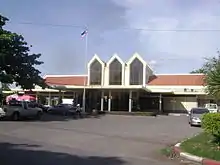
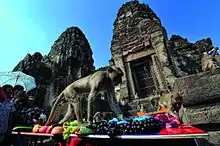
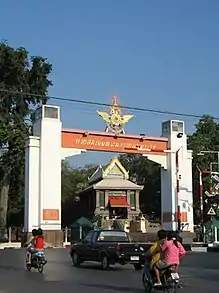
Rail
Lopburi railway station is a station of the State Railway of Thailand's Northern Line, the end of Bangkok's suburban service.
Roads
The main road through Lobpuri is Route 1 (Phahonyothin Road), which starts in Bangkok, and continues through Lopburi, Chai Nat, Nakhon Sawan, Kamphaeng Phet, Tak, Lampang, Chiang Rai, and the border with Burma at Mae Sai. Route 311 leads west to Sing Buri, and Route 3196 leads south-west to Ang Thong.
Air
Khok Kathiam Air Force Base is 9 kilometres (5.6 mi) north of the town. It has no commercial flights.
Health
Lopburi's main hospital is King Narai Hospital, operated by the Ministry of Public Health.
Education
- Thepsatri Rajabhat University
- Kasetsart University, Lopburi Campus
- Ramkhamhaeng University, Lopburi Campus
- Pibul Wittayalai School
Events and festivals
- King Narai Reign Fair (งานแผ่นดินสมเด็จพระนารายณ์): Event held annually, it is considered the greatest fair of the province. The objective is to honour King Narai the Great, who used to live here. The highlight is that all Lopburi people are dressed in traditional Thai clothes throughout the province and there is a sound and light performance at the King Narai's Palace in the evening. This fair is promoted by Tourism Authority of Thailand (TAT).[17][18]
- Monkey Buffet Festival (เทศกาลโต๊ะจีนลิง): Annually buffet held during November for herd of macaques that live at ancient Khmer temple, Phra Prang Sam Yot and nearby Phra Kan Shrine in the centre of province, which they are like a symbol of the province. It was first organized in the year 1989.[19]
- Climbing Up Khao Wong Phra Chan Festival (ประเพณีขึ้นเขาวงพระจันทร์): Pilgrimage inscription by climbing up 3,790 steps of Khao Wong Phrachan (crescent moon hill), the province's highest hill that located in Khok Samrong district for pay homage to replica of the Lord Buddha's footprint and Buddha statues that enshrined on the top of the hill. This festival is usually held on the Chinese New Year period and has been very popular, especially from Thai people of Chinese descent.[20]
Human achievement index 2017
| Health | Education | Employment | Income |
| 29 | 30 | 36 | 52 |
| Housing | Family | Transport | Participation |
 |
 |
 |
|
| 31 | 49 | 70 | 55 |
| Province Lopburi, with an HAI 2017 value of 0.5797 is "average", occupies place 44 in the ranking. | |||
Since 2003, United Nations Development Programme (UNDP) in Thailand has tracked progress on human development at sub-national level using the Human achievement index (HAI), a composite index covering all the eight key areas of human development. National Economic and Social Development Board (NESDB) has taken over this task since 2017.[3]
| Rank | Classification |
| 1 - 15 | "high" |
| 16 - 30 | "somewhat high" |
| 31 - 45 | "average" |
| 45 - 60 | "somewhat low" |
| 61 - 77 | "low" |
| Map with provinces and HAI 2017 rankings |
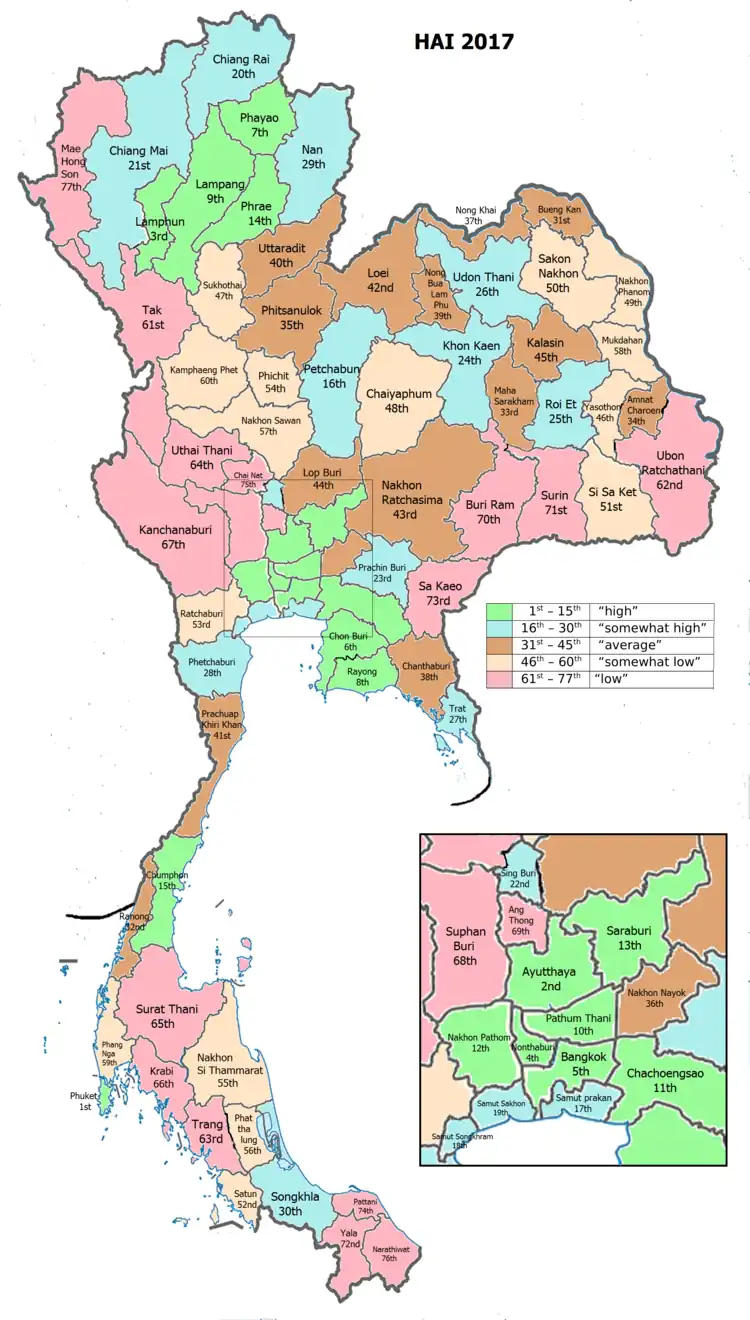 |
References
- ↑ Advancing Human Development through the ASEAN Community, Thailand Human Development Report 2014, table 0:Basic Data (PDF) (Report). United Nations Development Programme (UNDP) Thailand. pp. 134–135. ISBN 978-974-680-368-7. Retrieved 17 January 2016, Data has been supplied by Land Development Department, Ministry of Agriculture and Cooperatives, at Wayback Machine.
{{cite report}}: CS1 maint: postscript (link) - 1 2 "รายงานสถิติจำนวนประชากรและบ้านประจำปี พ.ศ.2561" [Statistics, population and house statistics for the year 2018]. Registration Office Department of the Interior, Ministry of the Interior (in Thai). 31 December 2018. Retrieved 20 June 2019.
- 1 2 Human achievement index 2017 by National Economic and Social Development Board (NESDB), pages 1-40, maps 1-9, retrieved 14 September 2019, ISBN 978-974-9769-33-1
- ↑ "Gross Regional and Provincial Product, 2019 Edition". <>. Office of the National Economic and Social Development Council (NESDC). July 2019. ISSN 1686-0799. Retrieved 22 January 2020.
- ↑ ประกาศราชบัณฑิตยสถาน เรื่อง การเขียนชื่อจังหวัด เขต อำเภอ และกิ่งอำเภอ (PDF). Royal Gazette (in Thai). 117 (พิเศษ 94 ง): 2. 14 September 2000. Archived from the original (PDF) on 25 January 2012.
- ↑ Phanindra Nath Bose, The Indian colony of Siam, Lahore, The Punjab Sanskrit Book Depot, 1927, p.v.
- ↑ "Lopburi". Tourist Authority of Thailand (TAT). Retrieved 21 June 2015.
- ↑ Cœdès, George (1968). The Indianized States of Southeast Asia (PDF). University of Hawaii Press. ISBN 978-0-8248-0368-1.
- ↑ "ย้ายเมืองหลวง?". 21 November 2011.
- ↑ "ตารางที่ 2 พี้นที่ป่าไม้ แยกรายจังหวัด พ.ศ.2562" [Table 2 Forest area Separate province year 2019]. Royal Forest Department (in Thai). 2019. Retrieved 6 April 2021, information, Forest statistics Year 2019
{{cite web}}: CS1 maint: postscript (link) - ↑ "ตาราง 5 พื้นที่เขตรักษาพันธุ์สัตว์ป่า พ.ศ. 2562" [Table 5 Wildlife Sanctuary Areas in 2019] (PDF). Department of National Parks, Wildlife Sanctuaries and Plant Conservation (in Thai). 2019. Retrieved 1 November 2022.
- ↑ "Climatological Data for the Period 1981-2010". Thai Meteorological Department. p. 15. Retrieved 22 December 2019.
- ↑ "Phra Prang Sam Yot". Tourism Authority of Thailand (TAT). Retrieved 2 November 2015.
- ↑ "Provincial Escutcheon". THAILEX Travel Encyclopedia. Retrieved 2 November 2015.
- ↑ "Lopburi province (จังหวัดลพบุรี)". Lopburi province. Retrieved 2 November 2015.
- ↑ "Number of local government organizations by province". dla.go.th. Department of Local Administration (DLA). 26 November 2019. Retrieved 10 December 2019.
51 Lopburi: 1 PAO, 3 Town mun., 20 Subdistrict mun., 102 SAO.
- ↑ Barrow, Richard. "King Narai Reign Fair: 14th-23rd February 2020". Thaifestivalblogs.com. Retrieved 23 February 2020.
- ↑ "เช้านี้วิถีไทย : นุ่งโจง ห่มสไบ แต่งไทย ไปเที่ยวงาน แผ่นดินสมเด็จพระนารายณ์มหาราช จ.ลพบุรี" [Chao Ni Thi Mo Chit : Dressed in Thai costumes, traveling to King Narai Reign Fair Lopburi Province]. Ch7 (in Thai). 21 February 2020. Retrieved 23 February 2020.
- ↑ Barrow, Richard. "Lopburi Monkey Party: 29th November 2020". Thaifestivalblogs.com. Retrieved 23 February 2020.
- ↑ Svasit, Pichaya (14 February 2019). "Buddhist Festival". Bangkok Post. Retrieved 2 March 2020.
External links
- Website of province (Thai)
- Lopburi provincial map, coat of arms and postal stamp Archived 21 June 2015 at the Wayback Machine